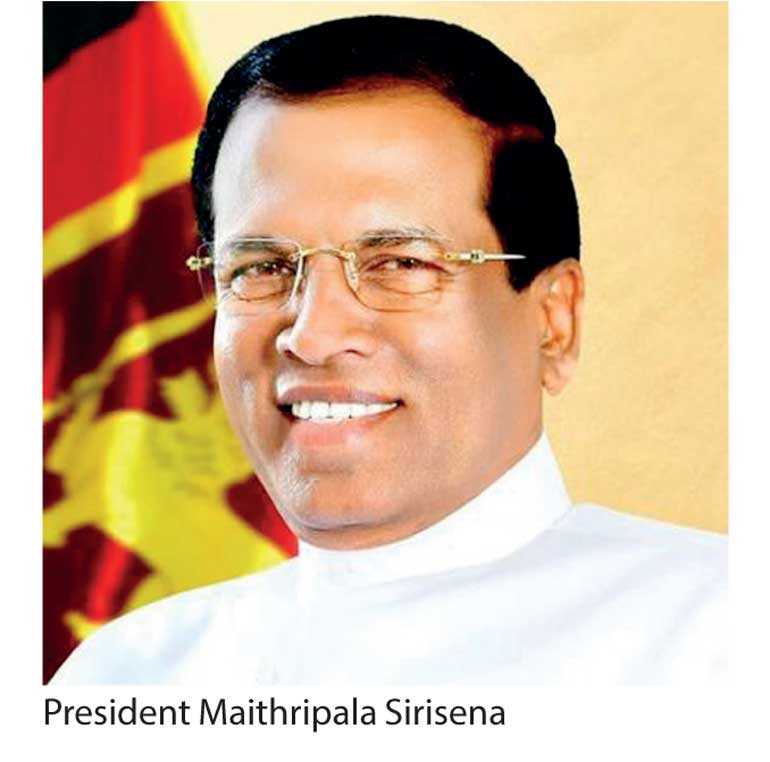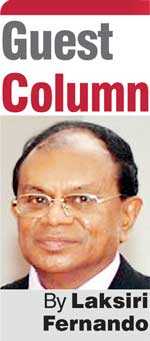Saturday Feb 21, 2026
Saturday Feb 21, 2026
Wednesday, 24 October 2018 00:00 - - {{hitsCtrl.values.hits}}


A.S. Panneerselvan ran a story this morning in The Hindu (00.00am, 22 October) titled ‘Don’t blame the messenger,’ referring to the controversial front page report of the same newspaper five days ago by Meera Sirinivasan on ‘Sri Lankan President Sirisena alleges that RAW is plotting his assassination,’ with the pretentious claim “for a responsible media organisation, telling the truth is imperative even if it means reporting tactless utterances”.
The Hindu or Meera Sirinivasan is the messenger. What is the message?
Reporting a news is perfectly acceptable or even imperative, after reasonable verification that the initial journalist had done. However to claim that report is the absolute truth, or nothing but the truth, is farfetched and unwarranted. Subjectively of course the journalist who reported the news or even the whole newspaper establishment may consider the story is the truth. But that claim is questionable, unless they are Gods, because the information has particularly emerged under questionable circumstances which the newspaper and the journalist/s are quite privy to.
Questionable circumstances?
What are these questionable circumstances?
First, there had been reportedly a heated argument between the President and the Prime Minister of Sri Lanka surrounding proposed development projects with the partnership of India.
Second, there had been reportedly some accusations and exchange between the President and some Ministers belonging to the other party of the coalition, the UNP, on the ongoing CID investigations on the alleged assassination conspiracy against the President and the former Defence Secretary.
It is well known that the Minister of Finance and Media, Mangala Samaraweera, publicly dismissed the conspiracy allegations, whether it has had any impact on the ongoing investigations or not. Therefore, the information coming under such circumstances should be circumspect, not to take the news as the final truth.
Panneerselvan has sufficiently defended the colleague journalist under a separate section of the article (“The act of verification”) and there is no issue of that defence except his questioning of ‘the President’s incredible statement,’ as if he not only believes that the President made such a statement, but also implying the accusation is not credible. The second implication is the most questionable.
The following is what the Indian Prime Minister’s office has stated in nutshell after President Sirisena’s telephone call on the matter.
“The Prime Minister appreciated the prompt steps taken by the President and his Government to firmly refute the malicious reports by publicly clarifying the matters. He also reiterated India’s emphasis on ‘neighbourhood first’ policy and the priority the Government of India and he personally attach to developing even stronger all-round cooperation between the two countries.”
It should be noted that the statement names “the malicious reports” not only referring to The Hindu, but also to many other news reports in Sri Lanka, apparently emerging from the same sources.
What is the message?
It is a mindboggling question why Panneerselvan is appealing in his today’s article ‘Don’t blame the messenger’. The reason is not clear or ambiguous. There can be two implications.
First, don’t blame the messenger for exposing the ‘incredible statement’ of the President. Second, don’t blame the messenger for exposing a possible RAW involvement in the alleged conspiracy.
Of course the second does not emerge from the initial report of Meera Sirinivasan, but from Panneerselvan’s report today. He says: “It has never been easy for reporters covering neighbourhood politics to report on the roles of agencies like the Research and Analysis Wing [RAW] and Pakistan’s Inter-Services Intelligence. As a reporter who has covered most of India’s neighbouring countries for nearly three decades, I can safely say that these agencies are named in most of the covert and overt operations — sometimes based on facts, sometimes based on pure hypothesis, and sometimes to suit domestic political realities.”
Is the above passage an indication that the President’s ‘incredible statement’ may be ‘credible’ under circumstances of, if not fact, but based on hypothesis? Or is it to ‘suit the domestic political realities’ that the report is made. However, it appears that it is the way at least Panneerselvan is operating or writing, as he says.
Under these circumstances, his initial claim that “responsible media organisations tell the truth” is questionable. I might be a last person to condemned media freedom, even if they tell lies, knowingly or unknowingly. I am an author of the ‘Lima Declaration of Academic Freedom’ acclaimed by UNESCO, and academic freedom is not dissimilar to media freedom.
Therefore, this is a friendly spat to remind the ‘colleagues’ not to claim for ‘truth’ instantly, but to find, report and interpret facts and allow the law enforcement and particularly the judiciary to find the reasonable ‘truth’ in this type of a case. Or allow the truth to emerge through a process, without jumping on a hurried ‘truth.’
N. Ram’s tweet
I am not a person searching or getting involved in the social media. It appears they have absolute freedom, I mean the social media, even Donald Trump tweeting and tweeting on all matters on earth.
But I was simply appalled when N. Ram’s quick tweet on this raw matter (reported in Colombo Telegraph, 19 October), not only defending The Hindu correspondent, but also accusing the Government or the President of falsehood. The question is not about the President or the Government, but again N. Ram’s claim about the ‘truth.’ This is what I am particularly questioning. There were two tweets on the same day, 19 October.
First: “Our Sri Lanka Correspondent verified what she had learnt with multiple independent sources before publishing her report. Let them issue their lame denials, try to wriggle out of what was said — but we stand by our Correspondent’s meticulously fact-checked story.”
This is fairly ok, as I have already stated, defending The Hindu correspondent. N. Ram is not only the former Editor in Chief of The Hindu but also the Chairman of the Kasturi & Sons Ltd., the publisher of The Hindu. Therefore, the concern is understandable. However, the second tweet is more questionable about the alleged truth.
Second: “Another case of saying something wild & bizarre, expecting it to remain within a closed room, and then blaming the media for the furore caused. The Hindu did its job — truth-telling.”
What is this ‘closed room’? The Cabinet meeting of a friendly neighbouring country which is supposed to have collective responsibility according to the democratic parliamentary norms, both India and Sri Lanka are supposed to follow.
Apart from The Hindu’s so quick jumping on ‘truth-telling,’ there is an apparent defence of RAW of any wrong doing, in Ram’s second tweet, by saying the alleged accusation is “wild and bizarre.” How does he know or so sure? This is not merely about a matter of fact, but of principle.
(Laksiri Fernando is former Professor of Political Science and Public Policy, University of Colombo.)